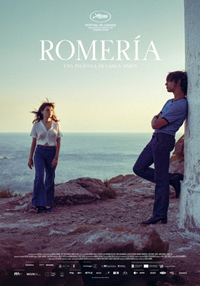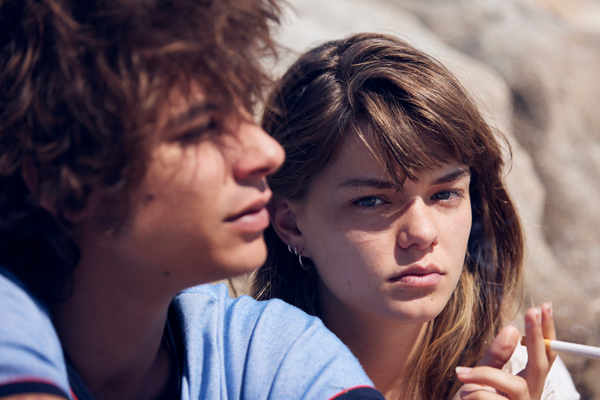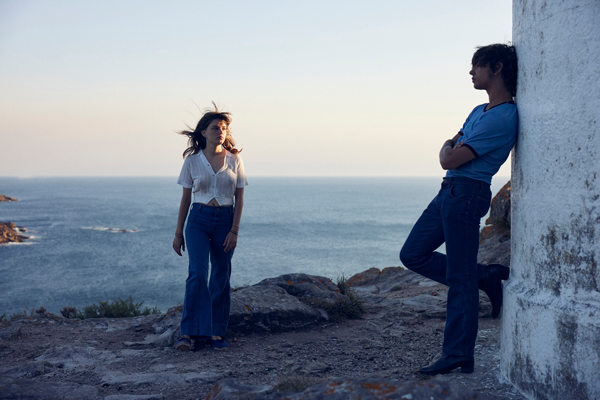Blood Relatives: Simon Treads Familiar Water with Continued Autofiction
 After winning the Golden Bear at the Berlin Film Festival for her 2022 sophomore film Alcarras, Carla Simón returns to the autobiographical roots inspiring Summer 1993 (2017), her debut feature. The narrative of a young girl who lost both parents to AIDS and is sent to live with relatives blossoms into a teenager’s search for identity in Romeria (an annual religious pilgrimage in Spain). Names and locations are changed with Simon’s return to this theme, which only shares a kinship through utilizing a main protagonist forced to confront the ignorance and resentment harbored by her estranged relatives. Hélène Louvart’s varied visual textures, including home video footage and grainy reenactments from the 1980s, are the highlight of a film which feels like a humble, highly personal exercise in catharsis for Simon. However, the increasingly monotonous narrative, underserved by a lack of dramatic conflict and a muted character arc, fails to compel.
After winning the Golden Bear at the Berlin Film Festival for her 2022 sophomore film Alcarras, Carla Simón returns to the autobiographical roots inspiring Summer 1993 (2017), her debut feature. The narrative of a young girl who lost both parents to AIDS and is sent to live with relatives blossoms into a teenager’s search for identity in Romeria (an annual religious pilgrimage in Spain). Names and locations are changed with Simon’s return to this theme, which only shares a kinship through utilizing a main protagonist forced to confront the ignorance and resentment harbored by her estranged relatives. Hélène Louvart’s varied visual textures, including home video footage and grainy reenactments from the 1980s, are the highlight of a film which feels like a humble, highly personal exercise in catharsis for Simon. However, the increasingly monotonous narrative, underserved by a lack of dramatic conflict and a muted character arc, fails to compel.
It’s 2004. Marina (Llúcia Garcia) has recently turned eighteen, pursuing a scholarship at university which requires her to obtain a status document allowing her to be eligible for it. After her mother died in Barcelona, Marina grew up with her adopted parents, and now she has the freedom to visit her father’s side of the family who all reside in her parents’ hometown, Vigo. Her mother’s diary, written twenty years prior, provides the only clues she has to exploring her roots. When she arrives, she’s dismayed to learn the sought after document requires an amendment, as she was not listed as his daughter. Meeting up with her aunts, uncles, cousins and grandparents, Marina receives a peculiar, chilly welcome, as many of them still have not processed the death of her father, due to AIDS complications. Luckly, her cousin Nuno (Alberto Gracia) seems interested in being honest with her.

Simon breaks up the film into chapter headings dictated in the current 2004 period, many of which are titled after Marina’s own sentiments. These tend to feel banal or pretentious (especially “Does sharing the same blood make you part of the family?” which suggests Marina has some maturing to do if these are the stand out musings warranting title headings). Likewise, the diary of Marina’s mother serves as a constantly referenced guide, though there’s nothing exceptionally enlightening there either, at least for anyone outside of Marina. In Simon’s most unnecessary flourish, we get an extended reenactment of Marina’s mother and father (played by Llúcia Garcia and Albert Gracia) which ends up bleeding into the shenanigans between Marina and her cousin Nuno. The most interesting visualization (if mostly because it stands apart by default) is a poetic reimagining of Marina’s parents dancing and doing drugs at an outdoor club as white sheets are placed over the revelers heads to insinuate their deaths. By the end of the song, they’re all gone, ravaged by AIDS and drug addiction.

We aren’t ever really led to a sense of who Marina is as played by Llúcia Garcia, perhaps because she doesn’t know yet herself. Studying cinema, there’s the initial promise of Romería taking the similar route as Joanna Hogg’s autobiographical The Souvenir films, but there’s really not much going on to move the story along. A notarized addendum is required for her father’s death certificate so Marina can be eligible for a scholarship. Her father’s parents offer money instead, she declines, and eventually the family is forced to reconsider. A sprawling introduction to aunts and uncles, plus a brood of cousins who run in and out frame make us wonder who might eventually matter enough to focus on. Marina’s vile grandparents are not forced into confrontation. An erstwhile bond with cousin Nuno develops, but not enough to explain why Marina would suddenly envision Nuno as her father in her mind’s eye fantasy sequence.
Pain and poignancy are elements which seem nearby, as if they’re going to bubble up, break through, and unleash emotional potency. But nothing comes to a head, as we’re constantly lulled back into a tide of muted observation (such as “I like the water here”). Whereas Summer 1993 was a delicately navigated narrative told through a small child’s perspective, Romería, perhaps fittingly, is the same tale from the vantage point of a boring teenager.
Reviewed on May 21st at the 2025 Cannes Film Festival (78th edition) – Competition. 115 Mins.
★★½/☆☆☆☆☆


